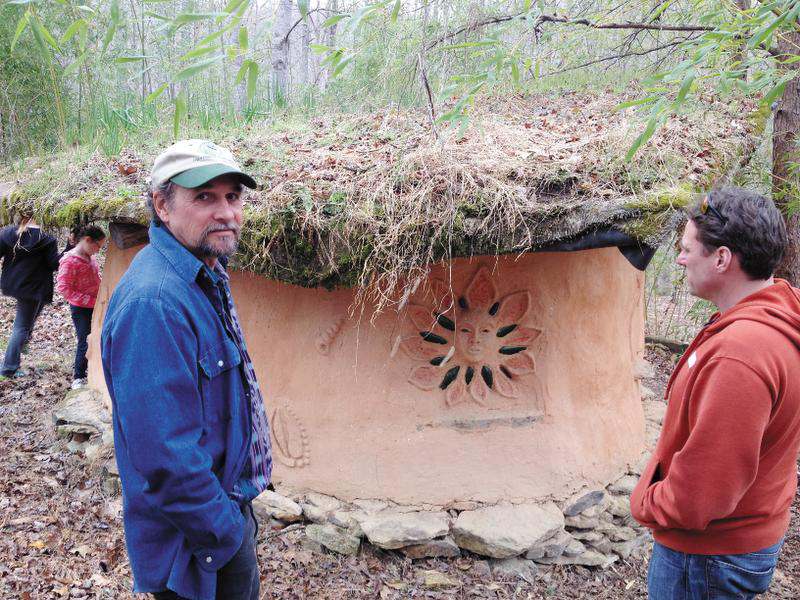Forty years after it was founded, The Farm Community, a commune in rural Tennessee, continues to thrive. In a recent visit to Malaprops Bookstore and Café, author Douglas Stevenson, the community’s resident historian, told the story of how a group of visionaries continue to make it work.
“People who get back to nature can’t do it alone,” Stevenson told a gathering of about 50 people on Saturday evening, July 19. “Rural living has to be social, with lots of different kinds of people.”
Stevenson has learned a lot about rural, communal living since 1973, when he moved to The Farm Community, which he described as “an intentional community founded … on the principles of nonviolence and respect for the earth.” He shared some of that knowledge using photos and stories he gathered over the years. He has written two books on what life is like in the Summertown, Tenn., community — Out to Change the World and The Farm Then and Now.
Stevenson began his story of The Farm in San Francisco, where 60 school buses carried a convoy of disillusioned people out of the city. These rosy refugees stopped near Nashville, Stevenson said, for its hospitality. They finally purchased the land that would become The Farm by pooled their resources and buying 1,000 acres of land for $70 an acre.
Photos provided a visual history of the early community: a modest-looking middle-aged hippie, the guru Stephen Gaskin, leading the group across the country and into the backwoods. A circled caravan of school buses in a field, which served as home when they landed in Nashville. Black-and-white photos of skinny, long-haired men behind horses and plows documented just how little the group began with.
They started working the land with horses, Stevenson said, but soon turned to tractors. Then a neighbor gave them a grader to make their own roads. They purchased a water tower for $1. For the first decade, they lived in Army tents. Housing was a patchwork of recycled building parts installed crudely onto canvas and an occasional tin roof.
More recent photos of The Farm who show far it’s come.
Slides included photos of the commune’s school, clinic and several thriving businesses — some publish books, make Geiger counters and deliver babies. The residents also dedicate themselves to helping people in need through the nonprofit, Plenty International, which has rebuilt entire towns in Guatemala and helped Hurricane Katrina victims rebuild their homes in New Orleans.
There were photos of how residents support themselves today. A soy dairy on The Farm makes tofu, and solar panels offset 90 kilowatts of the community’s electricity needs. The Farm is also home to the Ecovillage Training Center, where folks can learn the arts of permaculture, alternative house building, organic gardening and running a small rural business. The commune houses about 175 people and covers a total of about 4,000 acres. It even has its own cemetery, the final resting place of 89 former residents, Stevenson said.
His story involved a significant change that happened on The Farm in 1983, when residents chose to privatize some nonessential businesses. They decided to maintain their own road system, water system and housing, Stevenson said. The Farm allows for individual equity building, Stevenson explained, but no residents own their own home.
“So, you’re not going to lose your home to a bank, but it’s not like free living,” Stevenson said. “We maintain a very high quality and comfortable lifestyle.”
“I am continually amazed at what they were able to achieve by giving everything up,” said Stevenson’s son, Jody, who was born on The Farm and now lives in Asheville.
“They took a vow of poverty at the beginning, and I sometimes wonder if that is what it takes to succeed,” he said.
“If you try to achieve that today, it would take a lot of capital,” he added. “All they started with was school buses.”




Before you comment
The comments section is here to provide a platform for civil dialogue on the issues we face together as a local community. Xpress is committed to offering this platform for all voices, but when the tone of the discussion gets nasty or strays off topic, we believe many people choose not to participate. Xpress editors are determined to moderate comments to ensure a constructive interchange is maintained. All comments judged not to be in keeping with the spirit of civil discourse will be removed and repeat violators will be banned. See here for our terms of service. Thank you for being part of this effort to promote respectful discussion.